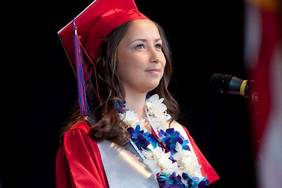Clayton Valley Charter High School (CVCHS) is an exemplar of how charter school conversion can rejuvenate a suffering public school. Founded in 1958 as Clayton Valley High School, it served part of Concord and nearby Clayton as a traditional public high school for more than 50 years. The idea to become a comprehensive conversion charter high school began in 2010 after staff, teachers, parents and community members alike felt they could no longer provide a quality education to students. This process was completed in July 2012, after a unanimous vote by the Contra Costa County Board of Education approved the conversion. Following success in its first three years as a charter school, CVCHS was renewed for another five years. It also received a 6-year “full term” of accreditation from the Western Association of Schools and Colleges because of outstanding academic data during its initial year as a charter school and was recognized as the highest academic improvement in the state for large high schools.

Since CVCHS made the conversion, it has seen significant improvement in numerous categories. This becomes very apparent upon comparing statistics from the school’s 2011-2012 year, its last year as a traditional public school, to its 2014-2015 school year. In these three years, the college admissions rate, attendance rate, and graduation rate all increased, while the total number of suspensions, weapons possessions, and drug possessions simultaneously decreased. Further, in its time as a traditional public school, CVHS only met 10 out of 18 adequate yearly progress indicators created in the No Child Left Behind Act. After its charter school conversion, the school met 17 out of 17 indicators.
In addition to statistical improvement, new programs have helped students become more successful, such as the Targeted Case Management (TCM) Program. TCM was created to help students who receive multiple D or F grades. Once these students are identified and included in the program, they are paired with an academic counselor or school administrator who provides the student with additional accountability and support. This is done by monitoring the student’s weekly academic activities in aspects such as grades, assignments, and attendance and sending email updates to parents of these students. The program has been extremely successful, with 75% improvement in D and F grades during the 1st semester and over 1,000 grades improved by the end of the first semester. The relationships established through this program have helped to build rapport and community within the CVCHS school environment, as well as facilitate a standard of academic excellence.

Parents have played a critical role in the success of CVCHS. Two out of four spots on the school’s governing board are filled by parents, and one CVCHS parent volunteer manages an active list of over 250 parent volunteers ready to assist with activities such a front office support, campus cleanup, fundraising, maintenance equipment purchasing, and support for the annual Challenge Day and individual testing programs held on campus. This high level of involvement has not only incorporated parents into the CVCHS school community, but helped to create positive parent response. According to survey results provided by the school, 94% of parents believe CVCHS teachers care about their students, and 95% of parents state that their student is receiving a good education. Results are similar for students, with 92% of students reporting that teachers care greatly about them and are doing a good job preparing them for college, and 91% of students are very happy at CVCHS and highly recommend their school to other students.

The results of CVCHS’ conversion to a charter school have been widespread and reached various sectors of the school and local communities. It remains a success story of how schools can turn around previous shortcomings and become a model school.
About #ChartersWork: The Pacific Research Institute’s Center for Education is showcasing success stories from charter schools and individual charter school students to promote the benefits of school choice. To view more stories, visit www.pacificresearch.org/education/.
